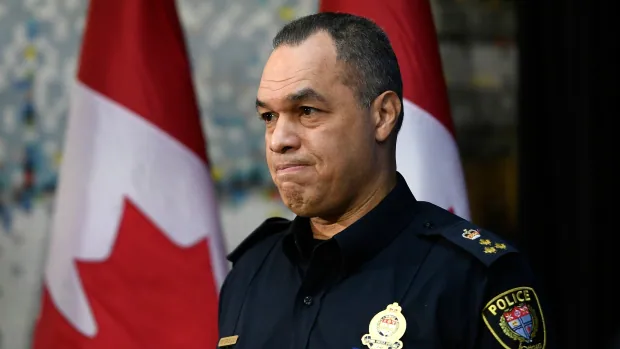Peter Sloly has resigned as Ottawa’s police chief and will publicly announce his resignation after the Ottawa Police Services Board meeting today, sources tell CBC News.
The former chief has been criticized over his handling of a truck convoy protest that has caused major disruptions to Ottawa’s downtown core.
Sloly’s resignation comes as sources tell CBC News he’s been accused of bullying and volatile behaviour that has damaged relations with senior leadership and compromised the force’s ability to cope with the truck protest.
Multiple sources have told CBC News that Sloly allegedly belittled and berated senior Ottawa Police Service officers in front of their colleagues, and has failed to put forward a solid operations plan to end the crisis.
Sources say he allegedly has come into conflict with members of the OPP and RCMP tasked with assisting the city’s law enforcement efforts during the crisis.
Sources both inside and outside the police service said Sloly has a short fuse and is quick to yell at members of his senior leadership team.
Since the protest and subsequent occupation of downtown Ottawa began, at least three incident response commanders have been reassigned after working with Sloly, the sources said.
One incident commander who was reassigned described Sloly as having no rationale for his decisions.
“This will all come out in a review,” another reassigned incident commander told CBC News. “I can’t say any more.”
The sources spoke to CBC News on condition they not be named because of concerns about career repercussions.
Chief sidesteps allegations
CBC News emailed Sloly and the Ottawa Police Service on Sunday and multiple times on Monday to seek comment on the allegations. The response provided to CBC News did not directly address or refute the allegations levelled against him by multiple sources.
“Chief Sloly and the Ottawa Police Service have been working, with our policing partners, around the clock for three weeks to end this illegal occupation of our city,” the statement said.
“This unprecedented situation, well beyond the experience of any municipal policing body in Canada, has put tremendous strain on all our officers.”
The statement said the Ottawa Police Service is working with the OPP and RCMP to establish a joint incident command that it says will see more resources and expertise made available to help end what many are calling the occupation of the nation’s capital.
“In future there will be an opportunity for a full review of the operation, but right now it is time to work together with our partners and focus on ending this illegal occupation,” the statement said.
OPS media relations told CBC News no one was available for an interview.
The Globe and Mail recently noted that, while deputy chief of the Toronto Police Service, Sloly was accused of doing a poor job of handling allegations of misogyny and was known in policing circles as someone quick to resort to heavy-handed measures.
During a special meeting of the Ottawa Police Services Board Friday, police board chair Coun. Diane Deans defended Sloly’s response to the crisis, saying that despite requests for help issued to the province and the federal government the OPS still did not have the resources it needed to end the occupation of the city.
The Ottawa Police Service is “working tirelessly with the resources they have and there has been some progress. There have been over 1,700 tickets issued, there have been at least 25 arrests, police have been working to seize fuel, they’ve made progress on clamping down on the encampment at Coventry Rd. and in Confederation Park, but it’s not enough,” Deans said at the meeting.
“We do not have the resource requirement that we have asked for at this point.”
Deans declined CBC News’ interview request Monday when asked about specific allegations related to Sloly’s behaviour as chief of police.
‘Ottawa Police Service is paralyzed’
Police and provincial sources have told CBC News that the Ottawa Police Service’s failure to provide the OPP and the RCMP with a firm operational plan for the 1,800 officers it has asked for has delayed the arrival of those extra officers.
Sources within and outside the OPS say they are concerned the force’s leadership is burned out and has reached a breaking point.
“Right now the Ottawa Police Service is paralyzed,” one source told CBC News. “They are paralyzed at the front line. They’ve been waiting for directions from the senior leadership team and are frustrated with how they’re being viewed by the public because of the spectacular failure of their leader.”
Sloly became chief of the Ottawa Police Service in October, 2019 with a mandate to help the force address systemic racism, improve its response to mental health calls and rebuild trust with the city’s Black community.
About a month after he took the position, a report found that Ottawa police were stopping a disproportionate number of people of colour in traffic stops.
In response to that report, Sloly, a Jamaican-born person of colour who had served 27 years on the Toronto police force, said he wanted to eliminate racism from the Ottawa Police Service.
“We should all have that sense of fierce urgency. Not enough is being done, it’s not being done fast enough and it’s not being done well enough,” Sloly said.





















Discussion about this post